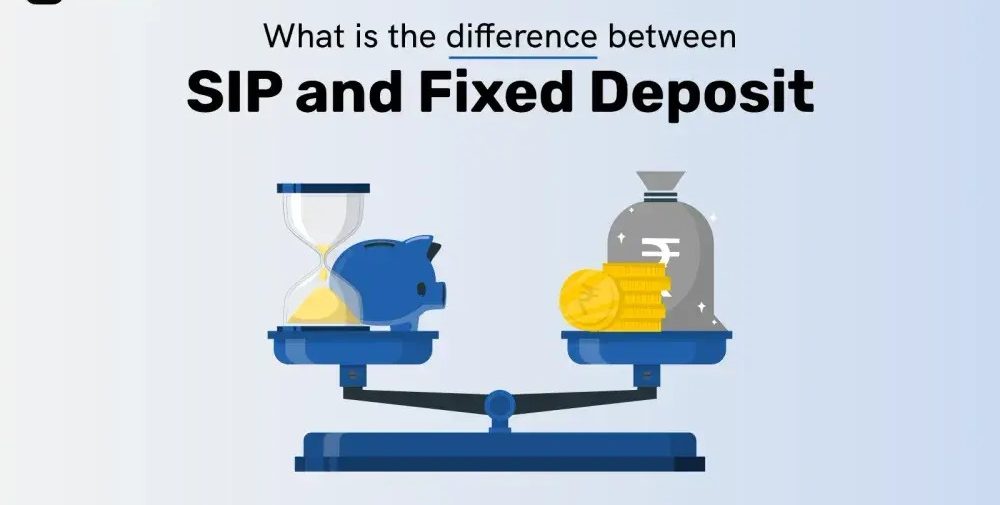
When it comes to investing money, many people find themselves confused about where to put their funds. With numerous investment options available in the market, it can be challenging to decide what’s best for you. If you’re stuck choosing between a Systematic Investment Plan (SIP) or a Fixed Deposit (FD), this article is here to help. We’ll compare the two options so you can make an informed decision when investing your hard-earned money.
Understanding SIP: What It Is and Its Benefits
A Systematic Investment Plan (SIP) allows you to invest a fixed amount regularly in mutual funds. It’s a disciplined approach to investment where you contribute a set amount every month.
Advantages of SIP
- Good Returns in the Long Term:
SIPs are known for delivering substantial returns when invested over the long term. The power of compounding helps your investments grow exponentially. - Small Investments Possible:
You can start a SIP with as little as ₹500. This makes it an accessible option for beginners or those with limited funds. - Rupee Cost Averaging:
Since you invest regularly, SIPs take advantage of rupee cost averaging. This means you buy more units when prices are low and fewer units when prices are high, reducing overall investment risk. - Flexibility:
SIPs offer the flexibility to pause, increase, or decrease your investments based on your financial goals and situation.
Drawbacks of SIP
- Market Dependency:
The performance of SIPs is tied to the stock market. If the market falls, the value of your investment can decrease temporarily. - Not Ideal for Short-Term Gains:
SIPs are not suitable for those looking for quick profits. They require patience and time to yield significant returns.
Understanding FD: What It Is and Its Benefits
A Fixed Deposit (FD) is a traditional and safe investment option offered by banks. In this scheme, you deposit a lump sum amount for a fixed period and earn a predetermined interest rate.
Advantages of FD
- Guaranteed Returns:
FD investments are not affected by market fluctuations. The interest rate is fixed, and you’re assured of consistent returns over the investment tenure. - Risk-Free:
Unlike SIPs, FDs are risk-free and secure. Your principal amount is safe, making it a reliable option for conservative investors. - Customizable Tenure:
You can choose the duration of your FD based on your needs. This could range from a few months to several years. - Bank Trust:
FDs come with the trust and credibility of banks, ensuring your money is in safe hands.
Drawbacks of FD
- Lower Returns:
The biggest downside of FDs is their limited returns. Compared to SIPs or other market-linked investment options, FD returns are relatively low. - Limited Compounding Benefits:
FDs offer limited compounding advantages, especially if you withdraw the interest monthly or annually. This can cap your overall earnings. - Premature Withdrawal Penalties:
If you withdraw funds from an FD before the maturity date, you may face penalties. This lack of liquidity can be a disadvantage during emergencies.
SIP vs FD: A Quick Comparison
| Parameter | SIP | FD |
|---|---|---|
| Risk Level | High (Market-dependent) | Low (Risk-free) |
| Returns | High (in the long term) | Low (Fixed rate) |
| Liquidity | Flexible (Can be stopped anytime) | Limited (Penalties for early withdrawal) |
| Investment Amount | Small amounts (₹500 or more) | Lump sum required |
| Market Fluctuations | Affects investment value | No impact |
Which Option Should You Choose?
Choosing between SIP and FD depends on your financial goals, risk appetite, and investment horizon.
- Opt for SIP if:
You are looking for higher returns in the long term and are willing to tolerate market risks. SIPs are ideal for wealth creation over a period of 5–10 years or more. - Opt for FD if:
You prefer a secure, risk-free investment with guaranteed returns. FDs are best for short-term financial goals or as a safe parking spot for your funds.
 Suspense Crime Sach Ka Dam
Suspense Crime Sach Ka Dam


